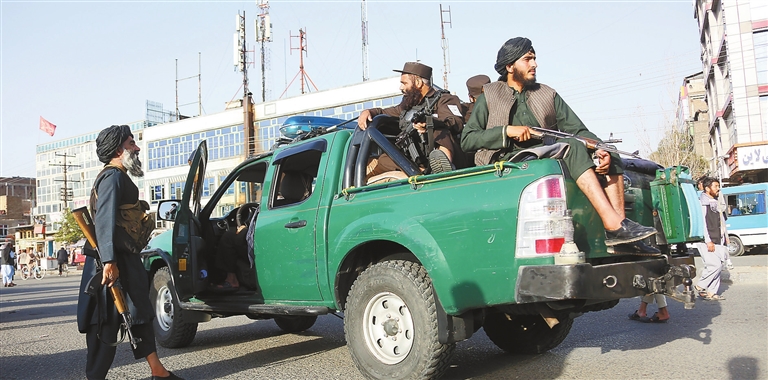
A YEAR has passed since U.S.-led coalition forces ran away from Afghanistan, but the whammy of war and U.S. sanctions, among others, have left the unsettled country with a horrific legacy. The longest war in U.S. history ended with a dismal withdrawal after the last military transport plane took off from the Kabul International Airport on Aug. 30, 2021. Just as co-founder of the U.S. progressive advocacy group “Afghans for a Better Tomorrow” Arash Azizzada put it in an opinion piece published in The Hill on Thursday, “the occupation is over, but in the aftermath of its 20-year ordeal, America seems eager to pretend Afghanistan has ceased to exist when it’s indeed responsible.” Mess left behind “Afghanistan was the ultimate nation building mission ... and we had a moral obligation to leave behind something better,” wrote former U.S. President George W. Bush in his memoir, introspecting on the motives for ordering the invasion of Afghanistan in 2001. However, more than 174,000 people died directly in the war in Afghanistan, according to a report of the Brown University. And the 20-year occupation of Afghanistan by the United States destroyed the country’s infrastructure, devastated its economy and upended livelihoods. According to the Special Inspector General for Afghanistan Reconstruction set up by the U.S. Congress, annual per capita income in the country declined from US$650 in 2012 to US$500 in 2020. As a massive U.S.-built showpiece, the Kabul-Kandahar highway was once hailed as “the most visible sign” of America’s commitment to re-building Afghanistan after decades of war. Nowadays, the highway is described in local media as a glaring symbol of America’s failures, scarred with bomb-blast craters that snarl traffic. Over the past 20 years, the United States has neither made achievements in Afghanistan’s economic development nor laid the foundation for its security situation as it fought terrorism according to its own geopolitical goals. “The United States can add or remove any organization from the list of terrorist organizations as long as its own interests require,” professor of Political Sciences at Kabul University in Afghanistan Abuzar Khpalwak Zazai said. He added that America’s “anti-terrorism” war has caused the number of terrorist organizations in Afghanistan to exceed over 20 today. Economic collapse The United States, which hastily withdrew from Afghanistan and disregarded its responsibilities and obligations, deserves much blame for the mess it left behind. Regretfully, U.S. sanctions slapped on the country’s new administration have undermined the Afghan economic system. “The United States’ seizure of sovereign Afghan assets, hard-hitting sanctions and abrupt end to foreign aid has led to the world’s most dire humanitarian disaster, leading more than half the country to the brink of famine,” said Azizzada, co-founder of “Afghans for a Better Tomorrow,” an advocacy group organized by the Afghan diaspora in the United States. Since the United States has frozen Afghanistan’s overseas assets worth more than US$9 billion as part of its sanctions against the new government, Afghanistan is facing a non-reversible economic collapse. A frozen banking system and liquidity shortage mean that as many as 80% of people are in debt. “We reported late last year that an estimated 97% of Afghans could be living in poverty by mid-2022, and regrettably, that number is being reached faster than anticipated,” said the head of the United Nations Development Program Achim Steiner earlier this year. In addition, 20 years of war left severe infrastructure shortages, power supplies and professionals in Afghanistan. According to Abdul Nasir Rishtia, chief executive of Afghanistan’s steel mills union, 5,000 steel mills in Afghanistan face a shortage of key technical personnel. Washington “pursued economic warfare on the Taliban with zero consideration for the collateral damage it has inflicted on regular Afghans,” said Azizzada. As foreign investment has dried up and assistance for Afghanistan from the international community has fallen sharply, UN High Commissioner for Refugees Filippo Grandi said earlier this year that Afghanistan is experiencing a very grave crisis. Besides, the Food and Agriculture Organization of the United Nations and the United Nations World Food Program said the Ukraine crisis “continues to put pressure on Afghanistan’s wheat supply, food commodities, agricultural inputs and fuel prices.” Tragic ‘forgotten corner’ Although Afghanistan faces a severe humanitarian crisis, the war-torn country is quietly being forgotten by the United States and the West, like a “forgotten corner.” A destructive earthquake striking Afghanistan on June 22 killed more than 1,000 people, injured more than 3,000 others and destroyed more than 17,000 houses, mainly in Paktika and the neighboring Khost provinces. The United States has turned a blind eye to the worsening humanitarian disaster in Afghanistan and has undermined the local post-earthquake rehabilitation and reconstruction. Mohammad Nasim Haqqani, spokesperson of the State Ministry for Disaster Management and Humanitarian Affairs, said that the sanctions have undermined international cooperation with Afghanistan. “The negative impact of the sanctions is tangible as some institutions can’t receive humanitarian aid in cash through banks because of the U.S. embargo, and some countries can’t send assistance as the banking system has been affected,” Haqqani told Xinhua. According to a report by The Intercept on July 14, ahead of the contentious final vote on the 2023 National Defense Authorization Act, U.S. Congresswoman Ilhan Omar introduced an amendment “seeking to prevent the collapse of U.S. humanitarian aid to millions of Afghans.” The amendment came in response to language in the military spending bill that prohibits Defense Department funds from being used to “transport currency or other items of value to the Taliban, the Islamic Emirate of Afghanistan, or any subsidiary, agent, or instrumentality of either the Taliban or the Islamic Emirate of Afghanistan,” effectively halting American aid to the country. If the Act, with its current stipulations unrevised, becomes law, it “would leave Afghanistan at risk of an even greater public health catastrophe. Its broad restrictions would be an especially critical blow to the Afghan people,” said an opinion piece published Thursday in Undark Magazine, a nonprofit science outlet.(Xinhua) | 
